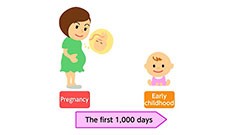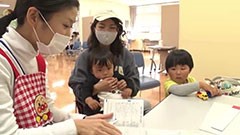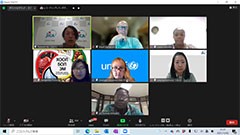To eliminate all forms of malnutrition

The first 1000 days" is said to be most effective to take measures against malnutrition.
JICA has positively promoted the activity for "Ending all forms of malnutrition", which is one of the targets of SDGs Goal 2, through the cooperation in the field of maternal and child health, emphasizing on "The first 1000 days" that is said to be most effective to take measures against malnutrition.
From Tuesday, December 7, to Wednesday, December 8, 2021, the Japanese government sponsored Tokyo Nutrition for Growth (N4G) Summit 2021 . We produced JICA-Net multimedia-based learning material, "Maternal and Child Nutrition and SHOKUIKU in Japan - for health and well-being of children -" (external link) , which organizes the direction discussed in the summit and after that, and Japan's experiences with a storyline to show easily JICA's future direction for cooperation in the field of maternal and child nutrition (MCHN) for Japan and the world.
Japan's efforts of maternal and child nutrition (MCHN) and food and dietary education (SHOKUIKU)
In Japan, nutrition improvement is provided at every life stage from the prenatal period to older age through prenatal checkups, infant health checkups, the school lunch program and general health checkups. Through the consistent promotion of such nutrition policies and measures, Japan overcomes malnutrition in only a few decades following the end of World War II. Children's health has improved through repeated efforts and Japan's life expectancy is among the longest in the world.

Infant health checkups. It is a valuable opportunity for mothers and fathers to consult with physicians and public health nurses
Japan provides various nutrition-related services. They are linked to the country's maternal and child health services which are focused on the period from a mother's pregnancy up through her child's early childhood. The foundation of healthy dietary habits is then built since preschool ages with the school lunch program and food and nutrition education or SHOKUIKU. Those programs foster a strong awareness of health and promote good eating habits among the Japanese people from their childhood.
This material introduces concretely how Japan's efforts of MCHN and SHOKUIKU are made by showing each stage of children's growth, which starts from maternal and child health handbook and checkups, complementary feeding and school lunch are followed.
Utilized at JICA High-Level Side Event at Tokyo Nutrition for Growth Summit 2021

In the official side event, we screened the English digest version of the material firstly
Before Tokyo Nutrition for Growth Summit 2021, "Human Security and Nutrition - Addressing the double burden of malnutrition through the realization of collective impact-" was held by JICA and UNICEF as the official side event. In that event, we arranged the program and speakers mainly centering on the material. Specifically, we screened the English digest version of the material firstly, and next, experts who were at the frontline in each field spoke in order with the topics: Japan's experiences, maternal and child health handbook, and school lunch. About 300 people participated in this event.
In the summit, the content and development of the nutrition policy just like the material were discussed. It made us confirm that the content of the material fitted with international trends. We shared the material with the Ministry of Health, Labor and Welfare, which is the center of Japan's nutrition policy, and received high interest and reputation.
As an essential material to learn MCHN
In addition, we always show the material to trainees at the project and program related with MCHN as the introduction of Japan's MCHN. We already used the material in JICA Knowledge Co-Creation Programs such as Sustainable Development Strategies for Multi-sectoral Nutrition Improvement in the South Asia Region, Maternal and child nutrition program, the improvement of nutrition through agriculture, Malaysia LEP2.0 SHOKUIKU approach to strengthen diet-related disease prevention. 150 people including the trainees and those who involved watched the material. We plan to use it for Project for Supporting the Implementation of School Lunch Services in Mongolia and The maternal and child health book program in the future.
Because the material organizes Japan's experiences of MCHN and SHOKUIKU and its future direction, it is useful for almost all the programs of nutrition.
We produced a French version of the material that was strongly requested for those who were conducting the training. We also consider translating it into Portuguese for introduction in the Portuguese-speaking countries, to use it for Project for Improving Maternal and Child Health Services through Implementation of the Maternal and Child Health Handbook in Angola and The Project for Strengthening Maternal and Child Nutrition Services in Mozambique. We expect that Japan's knowledge would be utilized in many countries and regions and help the improvement of maternal and child nutrition through this material.
NOMURA Marika
Senior Advisor on Nutrition and Health
JICA Human Development Department
*The Material(s) mainly applied
Maternal and Child Nutrition and SHOKUIKU in Japan - for health and well-being of children -
This video introduces the efforts of maternal and child nutrition (MCHN) and food and dietary education (SHOKUIKU) that foster Japanese health consciousness and eating habits, focusing on the contents being carried out for pregnancy, childbirth, infants and school children.
In Japan, nutrition intervention and SHOKUIKU are conducted for each respective purpose in such areas as maternal health checkups, infant health checkups, school lunch program, and general health checkups. In particular, by concentrating nutrition intervention and SHOKUIKU in the early stages of life (pregnancy, infancy, preschool and primary education periods), health literacy and healthy diet habit are fostered in Japanese children. These efforts are implemented through close cooperation among multiple professions based on relevant laws and policies. To achieve SDG Goal 2, to eliminate all forms of malnutrition, and to prevent diet-related noncommunicable diseases, nutrition intervention in early stage of life is important. This video provides charatteristics and key points of maternal and child nutrition and SHOKUIKU through life cycle of our Japanese people in 30 minutes.




scroll